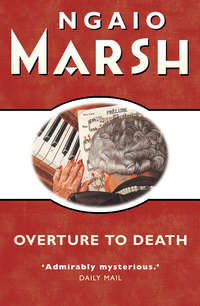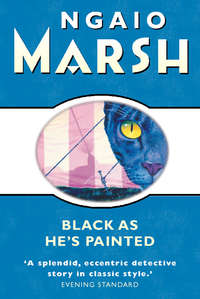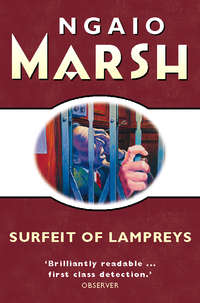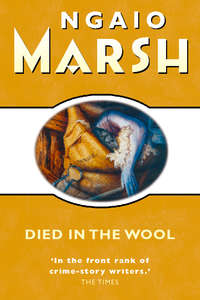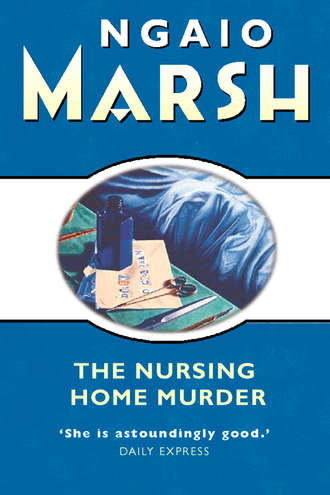
Полная версия
The Nursing Home Murder

Ngaio Marsh
The Nursing Home Murder

Table of Contents
Cover Page
Title Page
Chapter 1 10 Downing Street
Chapter 2 Introduces a Patent Medicine
Chapter 3 Sequel to a Scene in the House
Chapter 4 Post-operative
Chapter 5 Lady O’Callaghan Insists
Chapter 6 Chief Detective-Inspector Alleyn
Chapter 7 Post-Mortem
Chapter 8 Hyoscine
Chapter 9 Three Nurses
Chapter 10 Thoms in the Theatre
Chapter 11 The Anaesthetist
Chapter 12 The Lenin Hall Lot
Chapter 13 Surprising Antics of a Chemist
Chapter 14 ‘Fulvitavolts’
Chapter 15 The ‘Clean Breast’ of Sir John Phillips
Chapter 16 Reconstruction Begun
Chapter 17 Reconstruction Concluded
Chapter 18 Retrospective
Keep Reading
Copyright
About the Publisher
CHAPTER 1 10 Downing Street
Friday, the fifth. Afternoon.
The Home Secretary, with an air of finality, laid down the papers from which he had been reading and glanced round the table. He was struck, not for the first time, by the owlish solemnity of the other members of the Cabinet. ‘Really,’ he thought, ‘we look for all the world like a Cabinet Meeting in a cinema. We are too good to be true.’ As if to confirm this impression, the Prime Minister flung himself back in his chair, laid the palms of his hands on the table, and cleared his throat.
‘Well, gentlemen,’ he said portentously, ‘there we have it.’
‘Strong!’ said the Foreign Secretary. He folded his arms and stared at the ceiling.
‘Drastic!’ added the Lord Chancellor. ‘I venture to think—drastic.’
‘But in my opinion,’ the Postmaster-General said, ‘neither too strong nor too drastic.’ He fidgeted with his tie and became almost human. ‘Damn it all,’ he said irritably, ‘we’ve got to do something.’
There was a pause. The Home Secretary drew in his breath sharply.
‘Well,’ repeated the Prime Minister, ‘we have talked a great deal, gentlemen, and now we’ve heard the proposed Bill. We have all the facts. To put it briefly, we are perfectly well aware of the activities of these anarchistic personages. We know what they are about and we know they mean to take definite action. We are agreed that the importance of the matter can hardly be overstated. The reports from the FO, the Secret Service and the CID are sufficiently conclusive. We have to deal with a definite menace and a growing menace. It’s a bad business. This Bill’—he made a gesture towards the Home Secretary—‘may be drastic. Does anyone think it too drastic? Should it be modified?’
‘No,’ said the Postmaster-General. ‘No.’
‘I agree,’ said the Attorney-General.
‘Has it occurred to you,’ asked the Lord Chancellor, looking across the table to the Home Secretary, ‘that you yourself, Sir Derek, have most cause to hesitate?’
The others looked at him. The Home Secretary smiled faintly.
‘As sponsor for this Bill,’ continued the Lord Chancellor, ‘you will get a lot of limelight. We know what these people are capable of doing. Assassination is a word that occurs rather frequently in the reports.’ The Home Secretary’s smile broadened a little. ‘I think I do not exaggerate if I say their attention will be focused on yourself. Have you considered this possibility, my dear fellow?’
‘I quite appreciate your point,’ answered the Home Secretary. ‘The Bill is my child—I’ll not disclaim parentship and I’ll look after myself.’
‘I think the Home Secretary should be given proper protection,’ said the Chancellor of the Exchequer.
‘Certainly,’ agreed the Prime Minister warmly. ‘We owe it to the country. Her valuable assets must be guarded. The Home Secretary is an extremely valuable asset.’
Sir Derek made a curious grimace.
‘I can assure you,’ he said, ‘that I’m in no hurry to play the hero’s part in a theatrical assassination. On the other hand, I really don’t feel there is any necessity for me to walk down to the House surrounded by policemen dressed up as private secretaries and journalists.’
‘I met Roderick Alleyn of the CID yesterday,’ said the Prime Minister ponderously, ‘and discussed this business quite unofficially with him. He’s had these gentry under his eye for some time. He’s the last man on earth to exaggerate a position of this sort. He considers that the Minister who introduces a Bill to deal with them will be in real danger from the organisation. I strongly urge you to let the Yard take any measures it thinks necessary for your protection.’
‘Very well,’ said Sir Derek. He moved uneasily in his chair and passed his hand over his face. ‘I take it,’ he added wearily, ‘that the Cabinet approves the introduction of the Bill?’
They fell to discussing again the suggested measures. Their behaviour was weirdly solemn. They used parliamentary phrases and politicians’ gestures. It was as though they had so saturated themselves with professional behaviourism that they had lost the knack of being natural. The Home Secretary sat with his eyes fixed on the papers before him, as though sunk in a profound and unwilling meditation.
At last the Prime Minister put the matter to the vote—did the Cabinet consider the introduction of the Home Secretary’s Bill advisable? It did.
‘Well,’ said the Prime Minister, ‘that is as far as we need go.’
The Home Secretary groaned slightly.
They all turned to him. His face was extremely white and he was leaning forward over the table.
‘O’Callaghan!’ exclaimed the Postmaster-General. ‘What’s the matter? You’re ill?’
‘It’s all right. Pain. Pass off in a moment.’
‘Brandy,’ said the Prime Minister and stretched out his hand to a bell.
‘Water,’ whispered Sir Derek. ‘Just water.’ When it came he drank it greedily and then mopped his face.
‘Better,’ he told them presently, ‘I’m sorry.’
They looked uncomfortable and concerned. The Lord Chancellor hovered uncertainly over him. The others eyed him with that horrified ineptitude with which we observe sudden illness in our fellow men.
‘I must apologize,’ said Sir Derek. ‘I’ve had one or two bouts like this lately. Appendix, I imagine. I’ll have to get vetted. It’s an infernal bore for myself and everyone else. I want to stave it off until after this business if I can.’ He drew himself up in his chair, paused a moment, and then got slowly to his feet.
‘Everything settled?’ he asked.
‘Yes, yes. Won’t you lie down for a little?’ suggested the Prime Minister.
‘Thank you so much, P.M.—no, I’ll go home, I think. If someone could tell my chauffeur—’ A secretary was summoned. O’Callaghan turned to the door. The Postmaster-General made as if to take his arm. Sir Derek nodded his thanks, but walked out independently. In the hall the secretary took his coat from the butler and helped him into it.
‘Shall I come out to the car, Sir Derek?’
‘No, thank you, my boy. I’m my own man again.’ With a word of farewell to the Prime Minister he went out alone.
‘He looks devilish ill,’ said the Prime Minister irritably. ‘I hope to heaven it’s not serious.’
‘It’ll be damned awkward if it is,’ said the Postmaster-General. ‘Poor old O’Callaghan,’ he added hurriedly.
In his car the Home Secretary looked out of the window drearily. They turned out of Downing Street into Whitehall. It was a cold, gusty evening. The faces of the people in the streets looked pinched and their clothes drab and uneventful. Their heads were bent to the wind. A thin rain was driving fitfully across the window-pane. He wondered if he was going to be very ill. He was overwhelmed with melancholy. Perhaps he would die of this thing that seized him with such devastating agony. That would save the anarchists and the CID a lot of trouble. It would also save him a lot of trouble. Did he really care tuppence about his Bill or about the machinations of people who wanted to revolutionize the system of British government? Did he care about anything or anybody? He was conscious only of a pallid indifference and an overwhelming inertia. He was going to be ill.
At the top of Constitution Hill his car was held up by a traffic jam. A taxi drew up close beside it. He could see that there was a fare inside, but no more than that. The driver looked several times at O’Callaghan’s chauffeur and called out something which his man answered gruffly. O’Callaghan had the feeling that the person inside the taxi stared in at his window. He was being watched. He had experienced this sensation many times lately. He thought, with a sort of amusement, of the Prime Minister’s anxiety. He pulled a cord and the inside of the car was flooded with light.
‘Give them a good view while I’m about it,’ he thought grimly.
To his surprise the windows of the taxi were lit up as if in answer. He peered across, shading the pane with his hand. The taxi’s fare was a solitary man in a dinner-jacket. He sat with his hands resting on the knob of a stick. His silk hat was worn at a slight angle, revealing a clear-cut and singularly handsome profile. It was an intelligent and well-bred face, with a straight nose, firm mouth and dark eyes. The man did not turn his head, and while Sir Derek O’Callaghan still watched him, the ranks of cars moved on and the taxi was left behind.
‘That’s someone I know,’ thought O’Callaghan with a kind of languid surprise. He tried for a moment to place this individual, but it was too much bother. He gave it up. In a few minutes his chauffeur pulled up outside his own house in Catherine Street and opened the door of the car.
The Home Secretary got out slowly and toiled up the steps. His butler let him in. While he was still in the hall his wife came downstairs. He stood and contemplated her without speaking.
‘Well, Derek,’ she said.
‘Hallo, Cicely.’
She stood at the foot of the stairs and watched him composedly.
‘You’re late,’ she observed after a moment.
‘Am I? I suppose I am. Those fellows jawed and jawed. Do you mind if I don’t change? I’m tired.’
‘Of course not. There’s only Ruth dining.’
He grimaced.
‘I really can’t help it if your sister likes to see you occasionally,’ remarked Lady O’Callaghan tranquilly.
‘All right,’ said her husband wearily. ‘All right.’
He glanced at her inimically and thought how tiresomely good-looking she was. Always so perfectly groomed, so admirably gowned, so maddeningly remote. Their very embraces were masked in a chilly patina of good form. Occasionally he had the feeling that she rather disliked him, but as a rule he had no feeling about her at all. He supposed he had married her in a brief wave of enthusiasm for polar exploration. There had been no children. Just as well since there was a taint of insanity in his own family. He supposed he was all right himself. His wife would have brought out any traces of it, he reflected sardonically. Cicely was an acid test for normality.
She walked away from him towards the drawing-room. At the door she paused for a moment to ask:
‘Have you been worried at all by that pain today?’
‘Oh, yes,’ said O’Callaghan.
‘What a bore it is,’ she murmured vaguely, and went into the drawing-room.
He looked after her for a moment and then crossed the little hall and entered his own study, a companionable room with a good fireplace, a practical desk and deep square-angled chairs. Cedar logs blazed in the grate and a tray with glasses and a decanter of his particular sherry waited near his particular chair. She certainly saw to it that he was adequately looked after.
He poured himself out a glass of sherry and opened his afternoon post. It was abysmally dull. His secretary had dealt with the bulk of his letters and evidently considered that these were all personal. Most of them were so marked. One writer begged for money, another for preferment, a third for information. A typewritten envelope had already been opened by his secretary. It contained an anonymous and threatening message and was merely the latest of a long series of such communications. He picked up the last letter, glanced at the envelope, raised his eyebrows and then frowned. He finished his sherry and poured out another glass before he opened the letter and read it.
It was from Jane Harden.
From Jane. He might have known he wouldn’t hear the end of that business in a hurry. He might have known he was a fool to suppose she would let him go without making difficulties. That weekend in Cornwall—it had been pleasant enough but before it was over he’d known he was in for trouble. Damn it all, women were never fair—never. They talked about leading their own lives, said they wanted to get their experience like men, and then broke all the rules of the game. He glanced again over the letter. She reminded him that she had ‘given herself’ to him (what nonsense that was. She’d wanted it as much as he had!), that their families had been neighbours in Dorset for generations before her father went bankrupt. He flinched away from the imputation of disloyalty which, since he was a tolerably honest and conservative man, made him profoundly uncomfortable. She said he’d treated her as though she was a suburban pick-up. He wished fretfully that she had been. She wrote that she was going to a post in a private nursing-home. Would he write to her at the Nurses’ Club? Up to this point the letter had apparently been written with a certain amount of self-control, but from then onwards O’Callaghan saw, with something like horror, that Jane’s emotions had run away with her pen. She loved him but what had she left to offer him? she asked. Must they both forget? She was fighting for her soul and nothing was too desperate. There was a devil tearing at her soul and if she lost him it would get her. She added again that she loved him and that if he persisted in ignoring her she would do something terrible. With a sudden petulant gesture he crumpled up the sheet of paper and threw it on the fire.
‘Blast!’ he said. ‘Blast! Blast! Blast!’
There was a light tap on the door, which opened far enough to disclose a large nose, a vague mouth, a receding chin, and a gigantic earring.
‘Affairs of state, Derry?’ asked a coy voice. ‘Affairs of state?’
‘Oh, come in, Ruth,’ said Sir Derek O’Callaghan.
CHAPTER 2 Introduces a Patent Medicine
Friday, the fifth. Evening.
During the following week the Home Secretary followed his usual routine. He had become more or less accustomed to the attacks of pain. If anything they occurred more often and with increasing severity. He told himself that the day after he had introduced his Bill, he would consult a doctor. Meanwhile he took three tablets of aspirin whenever the pain threatened to become unendurable, and grew more and more dispirited and wretched. The memory of Jane Harden’s letter lurked at the back of his thoughts, like a bad taste in the conscience.
His sister Ruth, an advanced hypochondriac, with the persistence of a missionary, continually pressed upon him strange boluses, pills and draughts. She made a practice of calling on him after dinner armed with chemists’ parcels and a store of maddening condolences and counsels. On Friday night he retreated to his study, begging his wife to tell Ruth, if she appeared, that he was extremely busy, and not to be interrupted. His wife looked at him for a moment.
‘I shall ask Nash,’ she said, ‘to say we are both out.’
He paused and then said uncomfortably:
‘I don’t think I quite like—’
‘I too,’ said his wife, ‘find myself bored by Ruth.’
‘Still, Cicely—after all she is exceedingly kind. Perhaps it would be better—’
‘You will see her then?’
‘No, damn it, I won’t.’
‘Very well, Derek. I’ll tell Nash. Has your pain been worrying you lately?’
‘Quite a lot, thank you.’
‘That, of course, is why you are irritable. I think you are foolish not to see a doctor.’
‘I think I told you I would call in John Phillips as soon as this Bill was through.’
‘It’s for you to decide, of course. Shall I ask Nash to take your coffee into the study?’
‘If you please.’
‘Yes.’ She had a curiously remote way of saying ‘Yes,’ as though it was a sort of bored comment on everything he uttered.
‘Good night, Derek. I am going up early and won’t disturb you.’
‘Good night, Cicely.’
She stepped towards him and waited. By some mischance his kiss fell upon her lips instead of her cheek. He almost felt he ought to apologize. However, she merely repeated ‘Good night’ and he went off to his study.
Here his secretary Ronald Jameson awaited him. Jameson, just down from Oxford, was an eager but not too tiresomely earnest young man. He did his work well, and was intelligent. Normally, O’Callaghan found him tolerable and even likeable. Tonight, the sight of his secretary irritated and depressed him.
‘Well, Ronald?’
He sank down into his chair, and reached for a cigar.
‘Sir John Phillips has rung up, sir, and would like to come and see you this evening if you are free.’
‘Phillips? Has anyone been talking about me to Phillips? What does he want? Is it a professional visit?’
‘I don’t think so, sir. Sir John didn’t mention your—indisposition.’
‘Ring him up and say I’ll be delighted. Anything else?’
‘These letters. There’s another of the threatening variety. I do wish, sir, that you’d let me talk to Scotland Yard.’
‘No. Anything else?’
‘Only one, marked personal. It’s on your desk.’
‘Give it to me, will you?’
Jameson brought the letter and handed it to him. He looked at it and experienced the sensation of going down in a lift. It was from Jane Harden. O’Callaghan let his arm swing down by the side of his chair. The letter hung from his fingers. He remained staring at the fire, the unlighted cigar between his lips.
Ronald Jameson waited uncomfortably. At last he produced his lighter and advanced it towards O’Callaghan’s cigar.
‘Thank you,’ said O’Callaghan absently.
‘Is there anything I can do, sir?’
‘No, thank you.’
Jameson hesitated, looked uneasily at his employer’s white face, reflected that Sir John Phillips still awaited his message, and left the room.
For some time after the door had shut behind his secretary O’Callaghan sat and stared at the fire. At last, with an enormous effort, he forced himself to read through the letter. Jane Harden had written a frantic, bitter arraignment, rather than an appeal. She said she felt like killing herself. A little further on, she added that if an opportunity presented itself she would not hesitate to kill him: ‘Don’t cross my path. I’m warning you for my own sake, not for yours. I mean it, Derek, for you and all men like you are better out of the way. This is my final word.—Jane Harden.’
O’Callaghan had a swift mental picture of the letter as it would appear in the columns of the penny Press. Rather to his surprise O’Callaghan heard his wife speak to the secretary in the hall outside. Something in the quality of her voice arrested his attention. He listened.
‘—something seems to be worrying him.’
‘I think so too, Lady O’Callaghan,’ Jameson murmured.
‘—any idea—any letters?’ The voice faded away.
‘Tonight—seemed to upset—of course this Bill—’
O’Callaghan got up and strode across the room. He flung open the door.
His wife and Ronald Jameson stood facing each other with something of the air of conspirators. As he opened the door they turned their faces towards him. Jameson’s became very red and he looked swiftly from husband to wife. Lady O’Callaghan merely regarded Sir Derek placidly. He felt himself trembling with anger.
‘Hitherto,’ he said to Jameson, ‘I have seen no reason to suppose you did not understand the essentially confidential nature of your job. Apparently I have been mistaken.’
‘I’m—I’m terribly sorry, Sir Derek—it was only because—’
‘You have no business to discuss my letters with anyone. With anyone. You understand?’
‘Yes, sir.’
‘Please don’t be absurd, Derek,’ said his wife. ‘I asked Mr Jameson a question that he could not avoid answering. We are both very worried about you.’
O’Callaghan jerked his head. Jameson made a miserable little bow and turned away. At the door of his own room he paused, murmured ‘I’m extremely sorry, sir,’ and disappeared.
‘Really, Derek,’ said Lady O’Callaghan, ‘I think you are unreasonable. I merely asked that unfortunate youth if you had received any letter that might account for your otherwise rather unaccountable behaviour. He said a letter in this evening’s mail seemed to upset you. What was this letter, Derek? Was it another threat from these people—these anarchists or whatever they are?’
He was not so angry that he did not hear an unusual note in her voice.
‘Such threats are an intolerable impertinence,’ she said hastily. ‘I cannot understand why you do not deal with these people.’
‘The letter had nothing whatever to do with them, and my “unaccountable behaviour,” as you call it, has nothing to do with the letter. I am unwell and I’m worried. It may satisfy you to hear that John Phillips is coming in this evening.’
‘I’m delighted to hear it.’
The front-door bell sounded. They looked at each other questioningly.
‘Ruth?’ murmured Lady O’Callaghan.
‘I’m off,’ he said quickly. Suddenly he felt more friendly towards her. ‘You’d better bolt, Cicely,’ he said.
She moved swiftly into his study and he followed her. They heard Nash come out and open the door. They listened, almost in sympathy with each other.
‘Sir Derek and my lady are not at home, madam.’
‘But there’s a light in the study!’
They exchanged horrified glances.
‘Perhaps Mr Jameson—’ said Nash.
‘Just the man I want to see.’
They heard Nash bleating in dismay and the sound of Miss Ruth O’Callaghan’s umbrella being rammed home in the ship’s bucket. With one accord they walked over to the fireplace. Lady O’Callaghan lit a cigarette.
The door opened, and Ruth came in. They had a brief glimpse of Nash’s agonized countenance and then were overwhelmed in embraces.
‘There you are, darlings. Nash said you were out.’
‘We’re only “not at home,” Ruth darling,’ said Lady O’Callaghan, very tranquilly. ‘Derek expects his doctor. It was too stupid of Nash not to realize you were different.’
‘Ah-ha,’ said Ruth, with really terrifying gaiety, ‘you don’t defeat your old sister like that. Now, Derry darling, I’ve come especially to see you, and I shall be very cross and dreadfully hurt if you don’t do exactly what I tell you.’
She rummaged in an enormous handbag, and fetched up out of its depths the familiar sealed white parcel.
‘Really, Ruth, I can not swallow every patent medicine that commends itself to your attention.’
‘I don’t want you to do that, darling. I know you think your old sister’s a silly-billy’—she squinted playfully at him—‘but she knows what’s good for her big, famous brother. Cicely, he’ll listen to you. Please, please, persuade him to take just one of these teeny little powders. They’re too marvellous. You’ve only to read the letters—’


